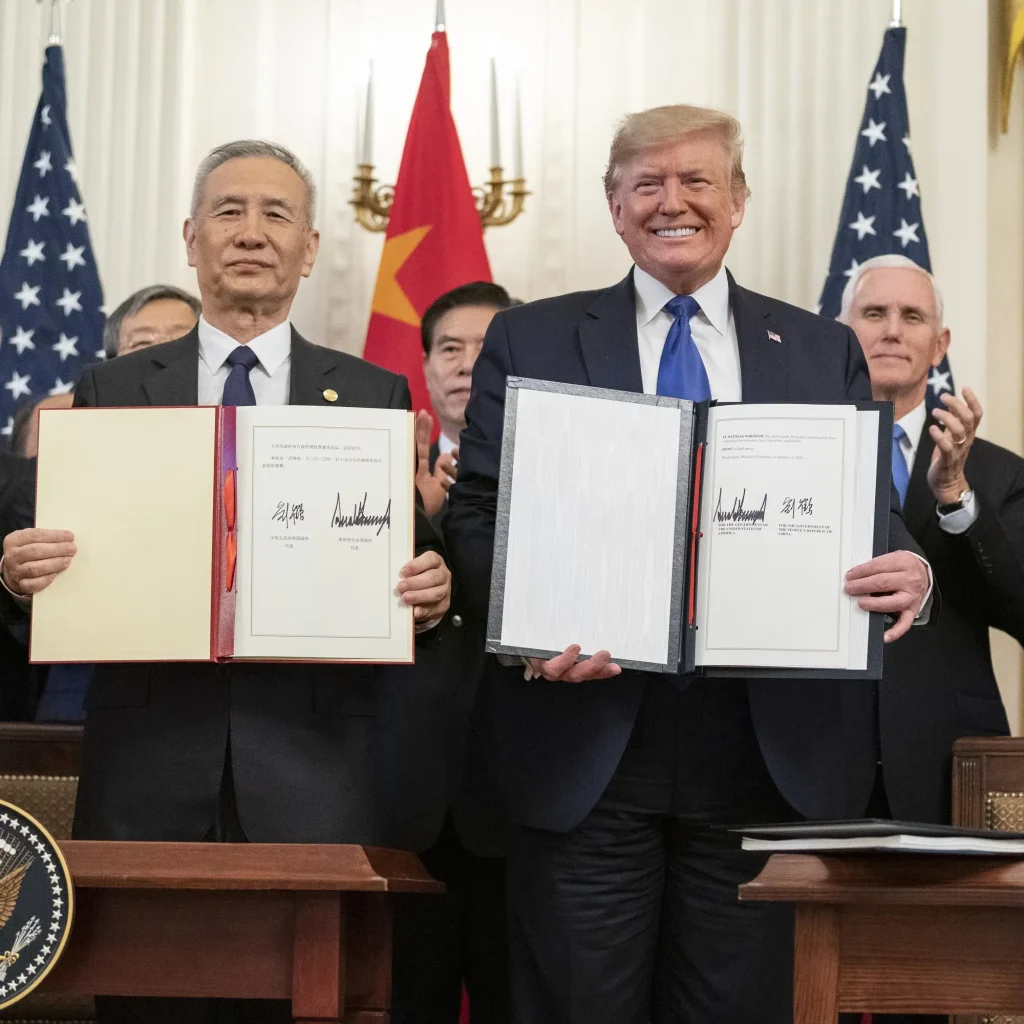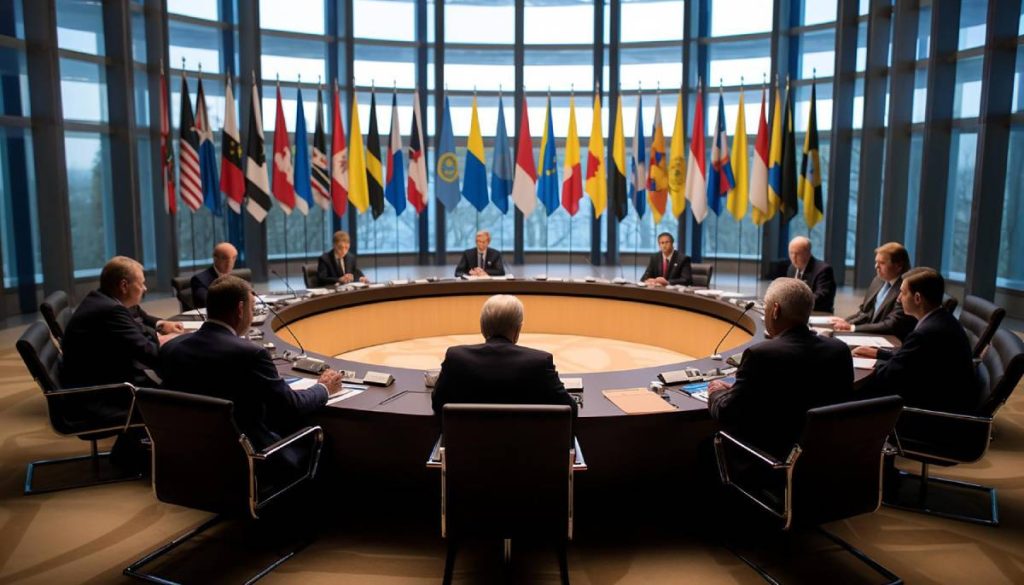U.S.-China trade negotiations have taken center stage as key officials from both countries come together to address growing tensions and economic disparities. Treasury Secretary Scott Bessent and trade representative Jamieson Greer are set to meet with their Chinese counterparts this week in Switzerland, a critical step in seeking resolution to the escalating trade war exacerbated by recent U.S. tariffs on China. With tariffs peaking at 145% on Chinese imports, the stakes have never been higher for international trade relations and economic policy. As both sides begin dialogue, the implications of their agreements could shape the future of their economic interactions. Observers remain hopeful that these talks will mark the beginning of a new era focused on fair trade practices rather than further retaliation.
The dialogue surrounding U.S.-China trade relations is becoming increasingly crucial as representatives from both nations prepare to meet and tackle outstanding economic issues. This upcoming meeting highlights the importance of diplomatic engagement in addressing the complexities of tariffs and trade imbalances that have developed over recent years. With both countries looking to mitigate the impact of their contentious trade war, the focus is shifting towards forging a balanced approach that promotes healthy economic interactions. Such discussions not only involve direct tariffs but also delve into broader topics such as China’s economic strategy and its consequences on global markets. As Bessent and Greer engage with their Chinese counterparts, the potential for easing tension and fostering cooperation remains a pivotal concern for international economic policy.
U.S.-China Trade Negotiations: A Step Towards Resolution
The upcoming meetings between U.S. Treasury Secretary Scott Bessent and trade representative Jamieson Greer with their Chinese counterparts in Switzerland represent a crucial step in the long-standing U.S.-China trade negotiations. Specifically, these discussions aim to address the tariffs imposed during the trade war initiated by the Trump administration, which has significantly impacted international trade relations. With tariffs soaring as high as 145% on Chinese goods, both nations are now faced with the reality that sustainable trade relationships must be reprioritized to prevent further economic fallout.
Amidst heightened tensions, Bessent has expressed a desire for de-escalation, indicating that the priority is to stabilize trading terms before pursuing a comprehensive trade deal. China’s reaction to U.S. tariff hikes—implemented in tandem with retaliatory tariffs—highlights the complexities of these negotiations, as both economies navigate the impacts of protectionist policies on their economic strategies. Successfully brokering an agreement will not only reshape bilateral trade relations but also set precedence for future international trading practices.
The Impact of U.S. Tariffs on China and Global Trade
The ramifications of the U.S. tariffs on China extend beyond loss of market access; they reshape global economic dynamics. With President Trump increasing tariffs to unprecedented levels, American goods have faced countermeasures from China in the form of high tariffs that reflect their discontent. This trade war not only disrupts U.S.-China trade but also poses significant risks to international trade relations, potentially triggering a domino effect among the U.S.’s trading partners who might reevaluate their own positions amidst uncertain trade policies.
As policymakers deliberate the implications of these tariffs, they must also consider how they affect global supply chains and economic stability. Industries reliant on imports or exports with China have expressed concern that continued tariffs could stunt growth and innovation. Exploring a resolution to these tariffs will be pivotal in restoring investor confidence and fostering a more balanced trade environment that can boost both nations economically.
China’s Economic Policy and Trade Relations
China’s economic policy has evolved significantly in response to external pressures, particularly concerning U.S. trade practices. Traditionally characterized by export-led growth, China’s recent adaptation necessitates innovative strategies as tariffs threaten to limit their market access to the U.S. The Chinese government views these trade negotiations not just as a means to alleviate immediate tensions but as an opportunity to assert their influence in international trade relations and ensure economic longevity.
By engaging in discussions with U.S. officials like Bessent and Greer, China aims to project a stance of cooperation while also safeguarding its economic interests. This balancing act becomes increasingly intricate as both nations weigh their domestic economic priorities against the necessity of mutual understanding in international trade. China’s approach may very well define the landscape of global economic policy in the years to come.
The Future of International Trade Relations
Amid the ongoing tensions surrounding U.S.-China trade negotiations, a broader conversation about the future of international trade relations is emerging. With countries increasingly prioritizing national security in economic dealings, the traditional benefits of free trade face unprecedented scrutiny. The reformation of trade agreements shaped by this new mindset will likely lead to changes in existing structures that govern international commerce.
The collaborative efforts between the U.S. and China, particularly during the negotiations spearheaded by Bessent and Greer, may serve as a template for future trade relations. As both nations consider the direction of their economies, these discussions will not only determine the trajectory of U.S.-China relations but could also influence global trading norms and standards, emphasizing a need for adaptability in policies against a backdrop of rising protectionism.
De-escalating Trade Tensions: A Path Forward
In seeking to de-escalate trade tensions, both Bessent and Greer emphasize that meaningful discussions must precede comprehensive agreements. The ongoing negotiations will focus on establishing a framework that can address the tariffs and corresponding retaliations without exacerbating the trade war further. Unsustainable tariff levels cannot sufficiently address the complexities of international commerce, thus necessitating a dialogue that aims for fairness and reciprocity.
As negotiations unfold, the potential for a thaw in relations could pave the way for a more cooperative international climate. Bessent’s articulation of economic security as paramount highlights the administration’s commitment to reforming trade practices that not only benefit the U.S. but also stabilize its economic partner, China. Finding common ground will be crucial in forging a future path that re-establishes trust and collaboration in trade matters.
High Tariff Impacts on Stock Market Dynamics
The stock market’s response to the announcement of trade negotiations reveals the sensitivity of financial markets to tariff-related news. Following the revelations of the upcoming meetings between Bessent, Greer, and their Chinese counterparts, stock futures surged, illustrating the market’s optimistic stance on potential resolutions to the ongoing trade war. Investors are keenly aware of how these tariffs constrict growth and profitability, and any sign of negotiations is seen as a positive signal.
The interplay of tariffs on market dynamics underscores the broader economic implications of trade policies. Any fluctuations in the market resulting from tariff news can ripple across sectors, affecting investor sentiment and guiding corporate strategies. With financial analysts closely monitoring the outcomes of these trade negotiations, the importance of dialogue in curtailing tariffs to restore stability in the markets cannot be overstated.
The Role of Economic Security in Trade Policies
Economic security has risen to the forefront of U.S. trade policy, with leaders like Bessent declaring that ‘economic security is national security.’ This integration of security into economic strategy highlights a significant shift in how nations perceive their trade agreements and relations. As the U.S. prioritizes its economic policy to include security measures, it sets a precedent that may influence other countries to align their own trade policies accordingly.
The focus on economic security means that nations will be pressing for trade relations that not only foster economic prosperity but also protect their interests from potential threats. Bessent’s statements reinforce the idea that future trade negotiations necessitate a careful evaluation of risks, thereby establishing a new paradigm where economic engagements are closely scrutinized in terms of national stability and security.
The Consequences of the Trade War for Global Economies
The ongoing U.S.-China trade war serves as a cautionary tale for the global economy, exposing vulnerabilities that arise in times of heightened protectionism. As both nations grapple with increasing tariffs, the potential for economic downturns becomes a shared concern for businesses and policymakers alike. Countries interconnected through trade may find themselves affected by tariffs levied against either nation, demonstrating the interconnected nature of today’s global economic landscape.
While the immediate goal of the U.S. trade agenda focuses on rebalancing trade with China, the long-term implications of a trade war affect countless economies intertwined with the two powers. Developing nations reliant on exports to either the U.S. or China must navigate the fallout from these escalating tensions carefully. Understanding and addressing these consequences is vital for maintaining global economic stability in the midst of trade conflicts.
Future Trade Agreements: Lessons from U.S.-China Talks
The lessons learned from the ongoing discussions between Bessent, Greer, and their Chinese counterparts could revolutionize future trade agreements not only between the U.S. and China but also globally. Increased emphasis on cooperative and strategic dialogues may pave a new path for resolving trade disputes, stressing negotiation over confrontation. The potential reshaping of trade policies could reflect a more flexible approach in dealing with intercountry trade relationships.
As the world observes these negotiations, the outcomes may serve as a benchmark for other nations grappling with trade disputes. Establishing norms rooted in diplomatic dialogue rather than conflict could enhance international trading systems and promote a climate of mutual respect and collaboration. Future trade agreements may increasingly prioritize these key lessons, promoting a more sustainable approach to global economic relations.
Frequently Asked Questions
What are the recent developments in U.S.-China trade negotiations involving Treasury Secretary Bessent?
The recent U.S.-China trade negotiations have involved Treasury Secretary Scott Bessent and U.S. Trade Representative Jamieson Greer meeting with Chinese officials to discuss economic and trade issues. This meeting in Switzerland is aimed at de-escalating the ongoing trade war that has been intensified by high tariffs set by both the U.S. and China.
How have U.S. tariffs on China impacted international trade relations?
U.S. tariffs on China, which have reached as high as 145%, have significantly strained international trade relations, particularly between Washington and Beijing. China has retaliated with its own tariffs, leading to increased tensions and discussions on how to resolve these trade issues to promote fair trade and economic stability.
What implications does the U.S.-China trade war have for both economies?
The U.S.-China trade war has profound implications for both economies, including potential recession risks, increased costs for consumers, and a strain on global supply chains. Both countries are aiming to negotiate terms that would alleviate these pressures while promoting better economic cooperation.
What is the significance of the Bessent Greer trade meeting for future negotiations?
The significance of the Bessent Greer trade meeting lies in its potential to establish a framework for de-escalation between the U.S. and China. By focusing on lowering tariffs and addressing mutual concerns about economic policies, this meeting could pave the way for more comprehensive trade agreements in the future.
How does China’s economic policy influence U.S.-China trade negotiations?
China’s economic policy plays a crucial role in shaping U.S.-China trade negotiations, as it dictates China’s approach to tariffs, trade agreements, and overall trade balance with the U.S. The negotiations often reflect the need for China to adapt its policies to foster a more reciprocal trade relationship with the United States.
What strategies are being considered to resolve the ongoing U.S.-China trade war?
To resolve the ongoing U.S.-China trade war, strategies being considered include reducing tariffs, improving trade agreements, and enhancing economic cooperation. Bessent and Greer’s meetings with Chinese officials aim to initiate dialogue and find common ground to reduce tensions between the two economies.
What role does economic security play in U.S.-China trade negotiations?
Economic security is a pivotal theme in U.S.-China trade negotiations, as officials like Bessent emphasize that economic stability is crucial for national security. Ensuring robust economic ties and addressing trade imbalances are seen as fundamental to protecting American interests while fostering a fair global trading environment.
What are the expected outcomes from the recent Bessent and Greer meetings with Chinese counterparts?
The expected outcomes from the recent meetings involving Bessent and Greer are focused on de-escalation of tariffs and trade tensions, fostering conditions for future negotiations, and establishing a constructive dialogue between the U.S. and China to achieve mutual economic goals.
| Key Points |
|---|
| U.S. officials Bessent and Greer to meet with Chinese counterparts in Switzerland. |
| Meetings aim to address trade and economic issues amidst an ongoing trade war. |
| Tariffs imposed by Trump increased on Chinese imports to 145%, leading to Chinese retaliatory tariffs. |
| Bessent emphasizes need for fair trade and mentions unsustainability of current tariff levels. |
| The talks are focused on de-escalation, not a comprehensive trade deal at this stage. |
| Bessent and Greer also scheduled to meet with Swiss President and Chinese Vice Premier. |
| Economic security framed as national security by Bessent, emphasizing the importance of balanced trade. |
| Trump indicated a flexible approach to negotiations, reiterating the need for deals favorable to the U.S. |
| Currently, U.S. negotiating with 17 partners, excluding China for now. |
Summary
U.S.-China trade negotiations are paramount as officials like Treasury Secretary Scott Bessent and Trade Representative Jamieson Greer seek to mitigate the escalating trade tensions. With increasing tariffs impacting both economies, these discussions in Switzerland signify a critical moment to recalibrate trade relations and emphasize economic security as a national priority. The approach set by U.S. officials reflects a desire for fair trade practices that benefit both sides, suggesting that productive dialogue may lead to a more favorable trading environment.



